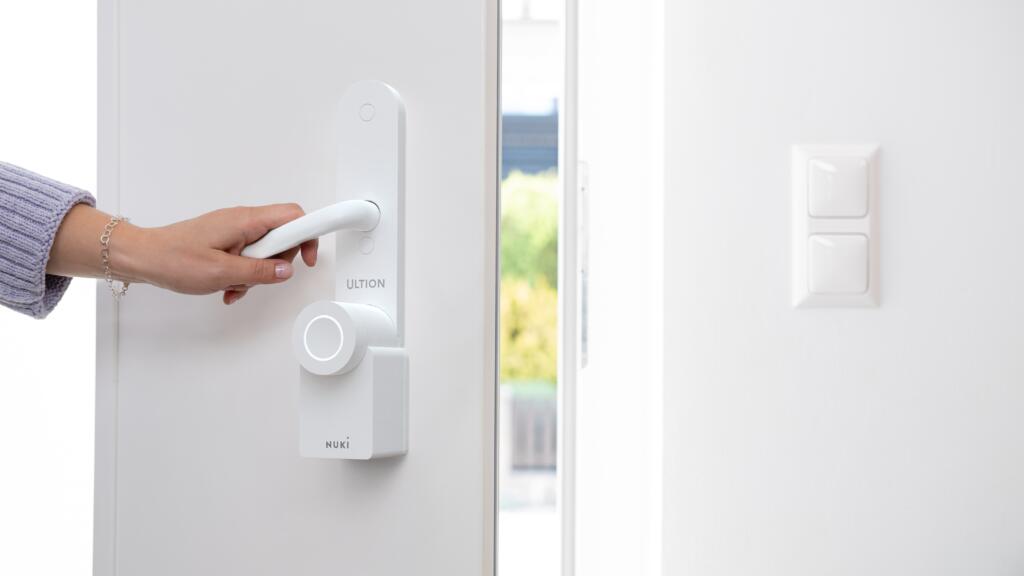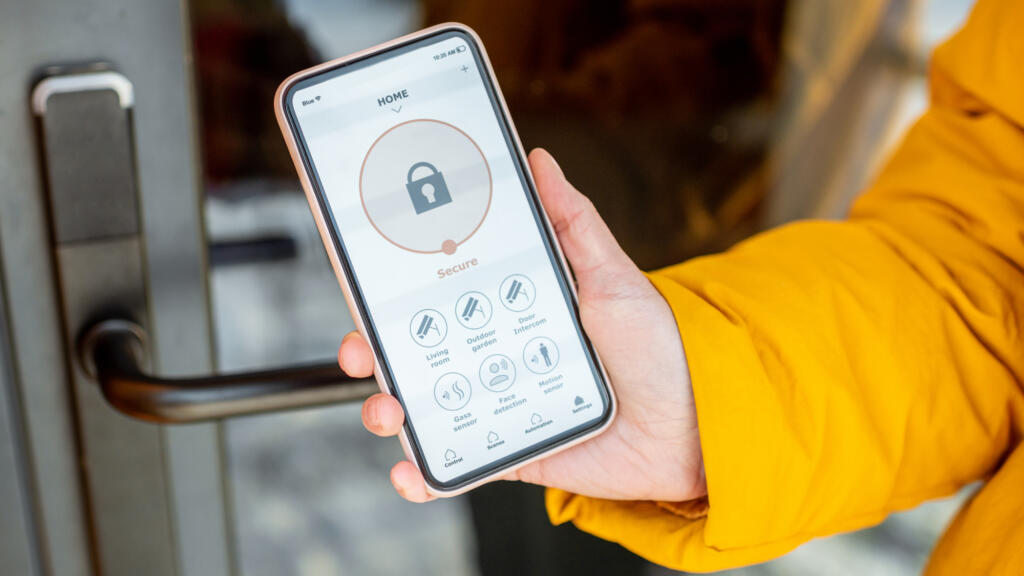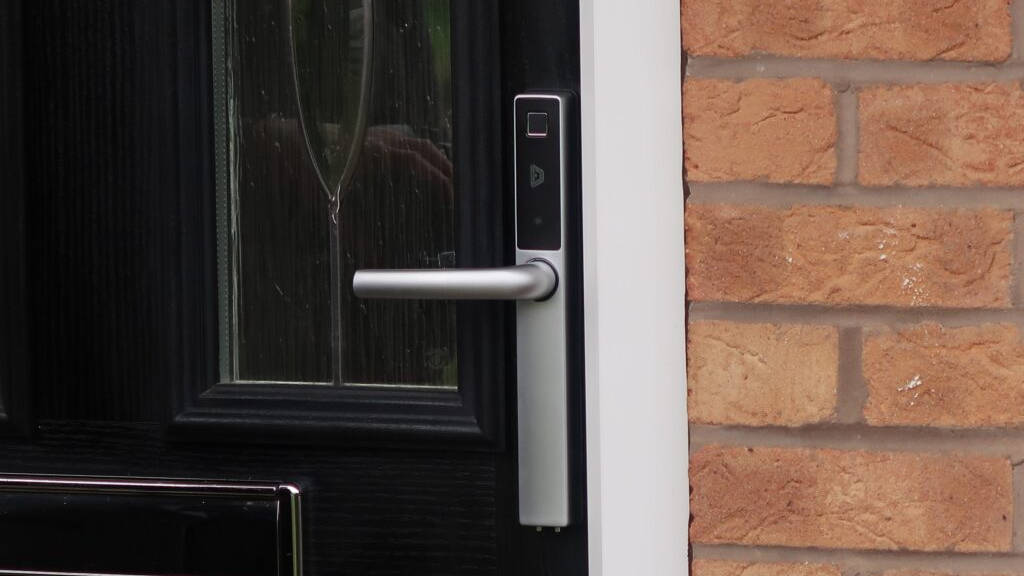
Should I buy a smart lock?
Jon Mundy
Are smart locks reliable? Are smart locks more secure than your standard locks? We have all the key information right here.
You might think that the standard way of locking and unlocking your door has served you well for your whole life, so why fix what isn’t broken?
What if we told you there was a relatively affordable way to make the process of gaining and granting entry to your house even easier? With a smart lock installed, you can lock and unlock your door from anywhere in the world without having to fumble around for keys.
You might think that the standard way of locking and unlocking your door has served you well for your whole life, so why fix what isn’t broken?
What if we told you there was a relatively affordable way to make the process of gaining and granting entry to your house even easier? With a smart lock installed, you can lock and unlock your door from anywhere in the world without having to fumble around for keys.
 Credit: Shutterstock / RossHelen
Credit: Shutterstock / RossHelenThis raises a number of questions around the function, security, and cost of smart locks. Given the fundamental role a door lock plays in keeping you, your loved ones, and your possessions safe, these are questions that need answering.
Here, then, is your one-stop guide to the exciting world of smart locks.
A smart lock is quite simply an electronic device that makes operating a door lock easier and more convenient. It can either attach to and work with your existing door lock or replace it entirely.
Buying and fitting a smart lock will enable you to use a digital key of some sort in place of a physical one.
Most commonly this will involve using your smartphone in conjunction with an app, but it can also take the form of key fobs, keypads, or even fingerprint sensors.
It depends on the smart lock brand and type, but a common feature of most smart locks is the ability to lock and unlock your door using your smartphone.
Once installed, you’ll be able to open the related app and press a button on screen to operate your door.
Many smart locks will be on the look out for your phone, so when you get close to your door it will unlock automatically. You can also set them to lock automatically when you leave your house, or when the door has been left unlocked for a certain period of time.
 Credit: Yale
Credit: YaleIf you’re a competent DIYer, you should have no problem fitting a smart lock yourself. If you’ve fitted a standard door lock before, the physical process will likely be familiar.
The other part of the equation is the ‘smart’ part, but if you have experience doing things like pairing Bluetooth speakers, headphones, or other smart home equipment with your smartphone and using the related apps, you should be absolutely fine.
With that said, every good smart lock should at least offer the option of a professional installation when buying. Some manufacturers, like Blusafe, strongly recommend a professional installation.
In general a good UK-focused smart lock should fit the existing fittings of your current multipoint door handle. However, it’s always important to double check that a smart lock will fit your existing door before you buy one.
All good smart lock brands should provide a means of checking compatibility through a dedicated website tool or FAQ section.
They may simply ask that you email them a picture of your door lock so they can double check.
While you can pick up a basic smart lock for less, you can expect to pay in the region of £200 to £300 for a top-end smart lock set-up from a reputable brand.
As mentioned above, you might need to factor in the cost of a professional installation, which will generally cost around £100.
If you’re unsure whether this is the right purchase for you, read our should I buy a smart lock feature for more guidance.
 Credit: Ultion
Credit: UltionWhile some smart locks require wiring into the mains, most of the best smart lock systems are powered by good old fashioned AA batteries. These will generally last between 6 months to a year, depending on the extent of your usage.
When these batteries start running out, most will let you know through a smartphone notification. They may also let you know through a visual indication (such as a flashing light) on the lock itself.
Smart lock reliability is important – the last thing you want is to be locked out of your house because of a power failure. That’s something you never have to worry about with a traditional key.
Because most smart lock systems rely on batteries, you might worry about the potential of being locked out when the batteries run dead. However, a good smart lock will always supply a backup.
In the case of the Ultion Nuki D, for example, you can still access the lock with a physical key supplied with your purchase.
With the Yale Conexis range (L1 from £199, L2 from £289.99) and the Blusafe Origin Smart (from £275), you can touch a standard 9V battery to the contacts on the bottom of the external lock to power the mechanism.
However, no one really wants to be carrying a 9V battery around with them, so it’s not an ideal solution.
It’s not just the power of your smart lock which may cause a headache, what if your smartphone runs out of power? You then couldn’t use it to open your day.
Thankfully, smart lock makers have thought about this already and offer a range of additional accessories.
Nuki, for example, has a keyfob remote you can carry on your person, and a number pad with fingerprint sensor you can affix to the exterior of your house – both of which can unlock your smart lock if your smartphone was to run out of battery.
There are an increasing number of smart lock brands on the UK market, some from familiar traditional security brands like Yale and Mighton (with its Avia Secure Smart Lock from £350 – only works with iOS), and others from newer specialists like Blusafe Solutions.
You’ll also find team-ups between older and newer brands, such as the one between British lock specialist Brisant-Secure and Austrian smart lock specialist Nuki.
 Credit: Blusafe
Credit: BlusafeThe mechanical lock component of a smart lock is no less secure than your standard door lock. This is because they will either retain your existing lock or replace them with a newer and typically more secure physical lock.
The connected element of a smart lock obviously offers a second possible vector of attack, but any good smart lock will be end-to-end encrypted, which means that only devices that you have approved can operate them. The chance of being hacked is extremely remote.
One thing to look out for is good smart locks will typically come with some form of security accreditation.
For example, Yale’s products have been awarded the BSI IoT Kitemark guaranteeing that they have “achieved the highest level of security for internet connected products”, while Bluesafe’s have also passed the relevant BSI certification. Nuki’s have been tested and certified at Germany’s AV-Test institute.
According to Nick Dutton, CEO of UK lock specialist Brisant-Secure, the benefit of owning a smart lock “isn’t simply the removal of having to turn the key in the door.
“It is the ability to lock and unlock the door from afar – whether that’s the next room, upstairs, at work, or from a different country.
“It is the ability to provide access for specific people only on specific days or times,” he continues. “It removes the pressure of key ownership, whether that’s for the homeowner or other trusted key holders. It also removes the need to ‘stay in’ when you’re expecting a delivery.”
Nick Dutton
CEO/Partner at Brisant-Secure Ltd.
Nick Dutton has worked in all aspects of the door and security industry for 30 years. As MD of one of the country’s largest door manufacturers, he gained first-hand experience of the ever-decreasing standards of lock and door hardware in the UK. This led to him teaming up with a renowned high-security lock designer to develop products that offer real-life security.
“UK doors are different to most other countries,” explains Dutton. “In the UK we have door handles with backplates, we have door handles that need to be lifted, we have locks that won’t operate from the outside if the key is left in the lock on the inside.
“These are some of the UK door idiosyncrasies that result in most smart locks not working on most UK doors.”
This has meant that the UK smart lock market has lagged behind other developed countries, and there are fewer options as a result. However, a new breed of high quality multipoint smart locks has started to emerge.
 Credit: Blusafe
Credit: BlusafeBecause most smart locks work with existing fittings, you should simply be able to replace any swapped-out elements of your old lock and take your smart lock to your new home.
Be sure to keep your old door handle components in safe storage for this very reason.
Smart lock systems don’t typically require an ongoing subscription. Once you’ve bought and installed one, the only ongoing cost should be the price of extra batteries.
Top-end smart locks will feature extended product ecosystems that can see you adding devices to your package to suit your needs.
For example, smart locks like the Yale Conexis L2 and the Ultion Nuki let you add keypads for around an extra £100, meaning you can gain access to your house by typing out a numerical code.
Other options can include key fobs and cards, which you can tap against the lock to gain entry.
 Credit: Yale
Credit: YaleMany smart locks can function at a basic level without Wi-Fi, using short-range Bluetooth or NFC connectivity to grant keyless entry.
However, more advanced smart locks will offer the option of adding a so-called Wi-Fi bridge, which is a device that plugs into a wall socket and connects your smart lock to your Wi-Fi.
With one of these, you can control your door lock from literally anywhere in the world.
Some do, but not all. With certain locks, you’ll be able to link them up to popular smart home platforms and smart assistants such as Google Home, Apple Homekit, and Amazon Alexa. Check with the manufacturer when shopping for your smart lock.
If a smart lock supports any such smart platforms, you’ll be able to control your smart lock through the associated hub or voice-based assistant, as well as through the dedicated app. You will need your smart lock to be connected to Wi-Fi in order to take advantage of such features.
Buying and installing a smart lock will enable you to lock and unlock your door remotely using a smartphone or some other form of digital key, as well as granting entry to anyone you like without the need to get a new key cut.
Top quality smart locks like the Ultion Nuki, the Yale Conexis L2 and L1, the Avia Smart Lock, and the Blusafe Origin Smart will all cost you a few hundred pounds initially, but they could potentially save you a lot of hassle in the long run.

Written by Jon Mundy
Published: Updated:
Jon is an experienced freelance writer who has covered consumer technology for some of the biggest tech websites since the beginning of the iPhone era. He’s never happier than when he’s ‘testing’ a new smartphone camera in a nice restaurant or cosy pub.